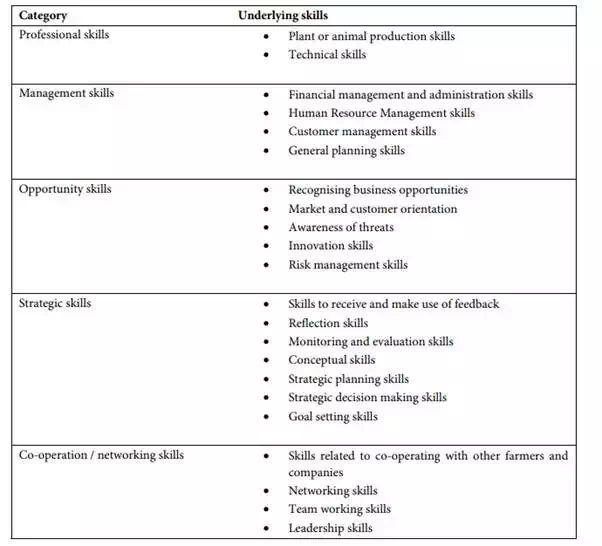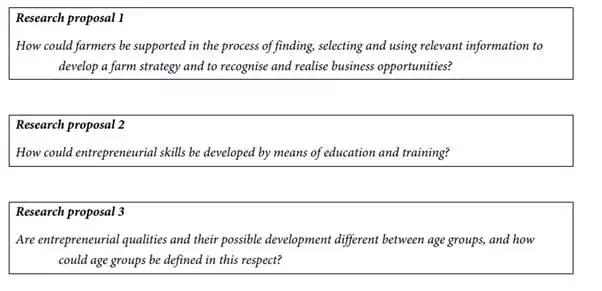Skills
The answers to the skills question are highly interesting for three reasons. The first is the variety of skills mentioned; the second interesting element are the many skills-related remarks made by the respondents, such as traits and attitudes. The third is that the results in all countries are highly similar. The skills mentioned by respondents as a result of question two could be categorised in five groups, as shown in Table 3.
In all countries some attention is paid to professional skills, being a basic requirement for farmers to succeed in the farming business. Many respondents from all countries emphasise the importance of management skills for farmers: in their opinion, farmers have to become businessmen, because of the growing complexity of the farming business.
Besides professional and management skills, other skills are also mentioned frequently, such as opportunity skills, co-operation and networking skills and strategic skills. These skills are required to find ways and strategies to develop a profitable business, to realise business opportunities and to develop and improve the business continuously. Comparing these skills with the scientific literature, these skills could be regarded as part of the qualities of an entrepreneur (e.g. Stevenson and Jarillo, 1990; Man et al, 2002).
Table 3: Skills categories mentioned in the interviews in six European countries.

In addition, respondents made a large variety of skills-related remarks that are important for farmers to succeed in business, as shown in Table 4.
Table 4: Skills-related remarks, made by interviewees in six European countries

Many of these remarks are related to the key concept of entrepreneurship as used in this study, e.g. flexibility and the ability to deal with uncertainties, a risk-taking attitude and commitment. Many respondents suggest that these items are pre-conditional to skills: without these qualities entrepreneurial behaviour is constrained and the development of skills is hindered.
In many interviews, higher education was supposed to have a positive effect on the entrepreneurial qualities of farmers. However, some respondents perceived that agricultural education is mainly focused on professional and management skills. Italian interviewees question if the current educational and training establishments are sufficient to teach and develop entrepreneurial skills. They suggest that innovative educational and training concepts are necessary.
Age is a difficult element in relation to entrepreneurial qualities. Some respondents think younger farmers are better entrepreneurs, because they are ambitious, more flexible and more open to new things. Others think older farmers are able to act in a more entrepreneurial manner, because of the life cycle of their farm organisations and their experience in business. The definition of younger and older farmers depends very much on the average age of the population, which differs between European countries.
Conclusions
Research question 1: What are the major trends and developments in the environment of the farm business?
The business environment of European farmers in all participating countries is changing rapidly. The main trends and developments are the globalisation of the market, the enlargement of the EU, the CAP reform (and Swiss agricultural policy), changing consumer demands and changes in the supply chain. These trends are perceived by respondents partly as opportunities and partly as threats.
Research questions 2 and 3: Which skills are demanded from farmers by the trends and developments in the business environment? Which skills can be seen as entrepreneurial, or how could entrepreneurial skills be defined?
To succeed in business, a farmer needs professional and management skills, strategic, opportunity and co-operation/networking skills. In our understanding of the entrepreneur concept, the last three categories can be summarised as entrepreneurial skills.
These entrepreneurial skills were selected with the help of scientific literature, although literature on this topic shows wide variations. Generally, entrepreneurial skills are related to the identification of business opportunities, finding means and resources to realise business opportunities by networking and co-operation, developing a business strategy and managing and improving the business.
Entrepreneurial qualities are not limited to skills only. Interviewees mention various traits and attitudes that are assumed to be preconditional for entrepreneurial behaviour and the development of entrepreneurial skills. The role of age and education is not very clear in respect of entrepreneurship, although respondents often mentioned both factors.
Out of the discussion about research questions 2 and 3, some research proposals could be formulated:

Research question 4: Do farmers need different skills compared to other business people?
Some respondents suggest that farmers need the same skills as other business people, mainly when talking about management and entrepreneurial skills. The interview results show a great similarity with literature about entrepreneurship in small and medium enterprises (McElwee, 2005). It would be worth researching whether the production of food and public goods needs other entrepreneurial qualities:
